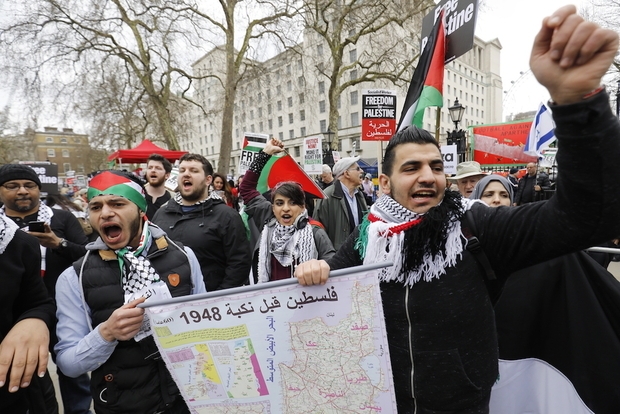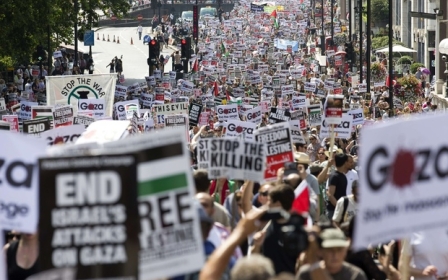Anti-Semitism row: Leading QC says IHRA definition unenforceable and misleading

The "working definition" of anti-Semitism adopted in 2016 by the International Holocaust Remembrance Alliance (IHRA) may suppress legitimate criticism of Israel while failing to cover "the most insidious forms of hostility to Jewish people", a leading British barrister said in a legal opinion released on Friday.
Geoffrey Robertson, a renowned legal scholar with expertise on human rights and free speech, said the British government's adoption of the IHRA's definition in 2016 "has no legal effect", as it was announced by Prime Minister Theresa May without input from the parliament.
Robertson's opinion was commissioned by the Palestine Return Centre.
The IHRA document provides a list of expressions that it considers anti-Semitic, including "claiming that the existence of a State of Israel is a racist endeavour".
It also warns against "drawing comparisons of contemporary Israeli policy to that of the Nazis" - a tactic used by some Palestinian solidarity groups to highlight Israel's mistreatment of Palestinians.
The IHRA definition and examples were never meant to be legally binding, Robertson argues. However, they may be used as a deterrent to free speech critical of Israel, as councils, academic institutions and NGOs may approach the subject cautiously to avoid repercussions.
"A particular problem with the IHRA definition is that it is likely in practice to chill free speech, by raising expectations of pro-Israeli groups that they can successfully object to legitimate criticism of Israel and correspondingly arouse fears in NGOs and student bodies that they will have events banned, or else will have to incur considerable expense to protect them by taking legal action," he wrote.
Robertson dissects the examples provided by IHRA and objects to a few of them.
On considering calling Israel a "racist endeavour", the barrister said the example "plainly trespasses on political speech".
He wrote that the example brands as anti-Semitic a "reasonably held view about the history of the Balfour declaration", which led to the establishment of the state of Israel.
"Whether the State of Israel is a 'racist endeavour' is open to question given its racially discriminatory laws and its new nation state Basic Law which is frequently said to make Palestinians second class citizens and likened by some reputable commentators to a form of apartheid," Robertson wrote.
More than 700,000 Palestinians were forced from their land in the events leading to the establishment of the state of Israel. Surviving refugees and their descendants still live in camps in neighbouring Arab countries, the West Bank and Gaza.
Robertson added that likening Israeli policies to Nazi Germany is a dramatic comparison that is not always anti-Semitic.
"It will usually be an exaggeration, or else inappropriate, and will invariably give offence to many Jewish people, but that does not necessarily make it anti-Semitic unless the Nazi comparison was intended to show contempt for Jews in general."
Earlier this month, more than 80 prominent organisations from black, Asian and minority ethnic (BAME) communities in Britain published a letter slamming attempts to silence the discourse on Palestine under IHRA's guidelines.
"We are deeply worried about current attempts to silence a public discussion of what happened in Palestine and to the Palestinians in 1948, when the majority of its people were forcibly expelled," the BAME letter reads.
Robertson's opinion comes amid signals that the Labour Party is prepared to adopt the full IHRA definition, including examples relating to Israel. Labour leader Jeremy Corbyn has faced accusations of anti-Semitism that his supporters say are unfounded.
In an attempt to defuse the crisis, the Labour Party's National Executive Council (NEC) is expected to adopt the full definition at a meeting on 4 September.
Earlier this week, several Palestinian groups associated with the Boycott, Divestment, and Sanctions movement (BDS), called on the Labour Party and affiliated trade unions to oppose the definition, which they said conflates "anti-Semitism with criticism of Israel".
The groups said IHRA's "discredited" definition aims to silence advocacy for Palestinian rights.
In July, more than 40 Jewish groups around the world, including several in the US, also rejected IHRA's guidelines.
"We urge our governments, municipalities, universities and other institutions to reject the IHRA definition and instead take effective measures to defeat white supremacist nationalist hate and violence and to end complicity in Israel’s human rights violations," the organisations said in a statement.
"Israel does not represent us and cannot speak for us when committing crimes against Palestinians and denying their UN-stipulated rights."
Robertson warned Labour and other organisations against adopting IHRA's definition without including a provision recommended by the UK parliament's Home Affairs Committee: "It is not anti-Semitic to criticise the Government of Israel, without additional evidence to suggest anti-Semitic intent."
He said the British government was wrong to embrace the definition without this disclaimer.
Middle East Eye propose une couverture et une analyse indépendantes et incomparables du Moyen-Orient, de l’Afrique du Nord et d’autres régions du monde. Pour en savoir plus sur la reprise de ce contenu et les frais qui s’appliquent, veuillez remplir ce formulaire [en anglais]. Pour en savoir plus sur MEE, cliquez ici [en anglais].




